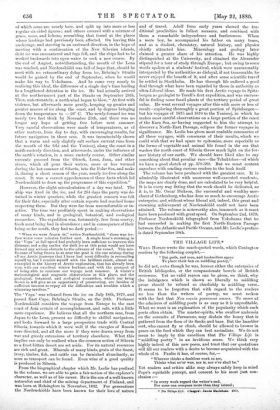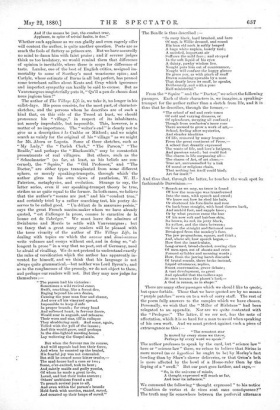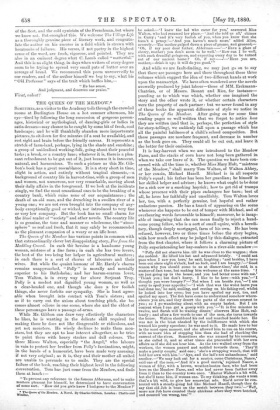THE VILLAGE LIFE.*
WHEN Horace wrote the much-quoted words, which Coningtorr renders by the following couplet,— "But gods, and men, and booksellers agree To place their ban on middling poetry," he did not, sates though he was, foresee either the enterprise of British bibliopoles, or the compassionate bowels of British reviewers. Yet no valid reason can be given, we think, why the indulgence which is shown so liberally to middling prose should be refused so churlishly to middling verse.. It seems to be forgotten that with regard to the readers no less than the writers of poetry, we must reckon with the fact that Non mania posettmits manes. To sneer at the admirers of middling poets is as easy as it is unprofitable. What we want is an explanation of the popularity which such
poets often obtain. The master-spirits, who swallow ambrosia on the summits of Parnassus, may disdain the honey that is- gathered from the flora of its flanks and base. But the humbler sort, who cannot fly or climb, should be allowed to browse in
peace on the food which they can best assimilate. We do not mean to imply by this exordium that The Village Life is. "middling poetry" in an invidious sense. We think very- highly indeed of this new poem, and trust that our quotations will fill our readers with a desire to become acquainted with the whole of it. Faults it has, of course, for,— " Whoever thinks a faultless work tO see, Thinks what ne'er was, nor is, nor e'er shall be."
Yet readers and critics alike may always safely keep in mind. Pope's equitable precept, and consent to his most just con- clusion :—
"In every work regard the writer's end,
For none can compass more than they intend ;
• Tile Village We. Glasgow: Jams Maclehoss. 1879.
And if the means be just, the conduct true, Applause, in spite of trivial faults, is due."
Whether such applause as we can gladly and even eagerly offer will content the author, is quite another question. Poets are as much the fools of flattery as princes are. But we have assuredly no mind to damn him with faint praise ; and if severer judges think us too laudatory, we would remind them that difference of opinion is inevitable, where there is scope for difference of
taste. Landor, one of the best of English critics, assigned im- mortality to some of Southey's most wearisome epics ; and
Carlyle, whose estimate of Burns is all but perfect, has penned some trenchant sallies about Keats and Gray which ignorance and imperfect sympathy can hardly be said to excuse. But as Vanvenargues magisterially puts it, " Qu'il a peu de chosis dont nous jugions bien !"
The author of The Village Life is, we take it, ho longer in his sallet-days. His poem consists, for the most part, of character- sketches, and the persons whom he describes are of such a kind that, on this side of the Tweed at least, we should pronounce his "village," in respect of its inhabitants,
not merely improbable, but impossible. This, however, is a matter of no importance. The "writer's end" is clearly not to
give us a description a /a Crabbe or Mitford ; and we might search as vainly for the original of his " village " as we might for Mt. Abora or Laputa. Some of these sketches, such as "My Lady," the "Parish Clerk," "The Parson," "The Beadle," and perhaps the "Blacksmith," may be counterfeit presentments of real villagers. But others, such as the " Schoolmaster " (so far, at least, as his beliefs are con- cerned), the "Squire," the "Old Professor," and "The Doctor," are either types transplanted from some different sphere, or merely speaking-trumpets, through which the author gives us his own views of pantheism, W. H.- Paterism, metaphysics, and evolution. Strange to say, the latter series, even if our speaking-trumpet theory be true, strikes us as quite equal to the former. In both cases, we believe that the author's "means are Just" and his "conduct true," and certainly tried by a rather searching test, his poetry de- serves to be called good. " Un defaut de la inanvaise poesie," • says the great French maxim-maker whom we have already quoted, " est d'allonger in prose, comme le caractere de la bonne est de l'abreger." We must leave the admirers of Swinburne and Morris to settle with Vauvenargues ; but we fancy that a great many readers will be pleased with the terse vivacity of the author of The Village Life, in dealing with topics on which the savane and demi-Imamate write volumes and essays without end, and in doing so, " al-
longent la prose" in a way that no poet, out of Germany, need be afraid of rivalling. We do not pretend to understand exactly
the rules of versification which the author has apparently in- vented for himself, and we think that his language is not
always quite grammatical,—but neither was Lord Byron's ; and as to the roughnesses of the prosody, we do not object to them,
and perhaps our readers will not. But they may now judge for themselves :—
"The parson had his victories :
Sometimes a wild revival came, Swift, crackling, like a forest-fire, Raging beyond his own desire, Causing the poor man fear and shame, And over all his vineyard spread.
Impossible to keep it safe In proper bounds; for crazy head And softened heart, in fervour fierce, Would roar in anguish, and rehearse Their woes and sins, tilrin collapse They shuddering sank. And some, again, Yelled with the yell of the insane; And this would grow, until perhaps In the dim-lighted meeting-house Lay weltering the Gospel-slain.
But when the fervour ran its course, And wild appeals had lost their force, And when he counted up the healed, His fearful joy was not concealed. But still he owned some bitter truths,— The mad-house had a case or two; Some, o'er-excited, took to beer ; And saintly maids and godly youths, Of whom he made a great to-do, Loved, and lost their looks austere; Others' ambitions found a call To preach revival joys to all, And even within the parson's bounds Held forth with unction, ranted, raved, And counted up their heaps of saved."
The Beadle is thus described :—
" In rusty black, hard brushed, and bare Of nap, is Willie dressed, and round His lean old neck is softly heaped A huge white napkin, loosely tied ; A satisfied, important air
Suffuses the mild face ; and steeped In the soft liquid of his eyes A dainty, pawky' wisdom lies.
Nought puts him out of countenance, Nought will confuse the happy glance He gives you, as with pinch of snuff Drawn sounding upwards by a nose That dearly loves its snuff, he speaks, Deliberately, and with a pose Half-ministerial." •
From the " Squire " and the "Doctor," we select the following passages. Each of their characters is, we imagine, a speaking- trumpet for the author rather than a sketch from life, and it is thus that he describes, through the former,—
" The school of sad and eerie tones Of cold and varying dimness, or Of splendours, merging all confused ; Though from confusion's inner core There seemed to grow a work of art,— School, feeling after mysteries, And slender idealities
Of life, removed by many leagues From the great continent of Prose,— A school that drearily expressed The waste of life, and love's fatigues, And passions sated ; but could find The charm in life surpassing all— The charm of Art, of art alone,— True art, untrammelled by a link Of moral or religions chain, That nothing but itself could bind; Art for itself." -
And thus that, through the latter, he touches the weak spot iix fashionable Darwinism :— "Search as we may, no trace is found
Of how the man-ape was transformed Into the man, with speech and creed;
We know not how he shed his hair,
Or shortened his fore-limbs and rose On back-bone straight, with head thrown back, And arched foot, and supple knee ; Or by what process came the hue Of his now soft and hairless skin, Its brown, its red, its jetty black, Its yellow, and the tints between ; Or how the straight and flattened nose Developed from the monkey's face, The jaw prognathous, square, and thick ;
And, above all, how speech began,—
How first the inarticulate, Long-armed, broad-chested, roaring clan Of men-apes, ont of shouts and cries Formed syllables and meaning words ; How, from the jarring harsh discords Of brutal sounds, there broke instead, Liquid utterances, replies, Sweet conversation, grave debate; A vast development, so great And splendid that the tailless ape At once became the planet's lord,— A God in reason, as in shape."
There are many other passages which we should like to quote;, but space forbids. Those that we have quoted are by no means "purple patches" sewn on to a web of sorry stuff. The rest of the poem fully answers to the samples which we have chosen. Personally, we wish that the "Miller of Birlstane " had been relegated to an appendix. Nor are we quite contented with the "Prologue." The latter, if we err not, has the note of affectation, which it is so hard for a man to avoid when speaking of his own work. And we must protest against such a piece of
extravagance as this :—
"The remotest star Is moved by every stone we throw, Perhaps by every word we speak."
The author professes to speak by the card, but "science law" here or "science law" there, we refuse to believe that Sirius is more moved (as ex hypothesi he ought to be) by Morley's fast bowling than by Shaw's slower deliveries, or that Orion's belt is more affected by the howl of a Home-ruler than by the lisping of a "swell." But our poet goes farther, and says,— " So, in the universe of minds, A thought expressed will reach as far, And bear its influence."
We commend the following "thought expressed" to his notice " Combien de vertus et de vices sent sans consequence-l" The truth may lie somewhere between the perfervid utterance
of the Scot, and the cold cynicisin of the Frenchman, but where we know not. But enough of this. We welcome The Village Life as a thoroughly genuine piece of literary work, and congratu- late the author on his success in a field which is strewn with hecatombs of failures. His verses, if not poetry in the highest sense of the word, are fresh, vigorous, and pointed. They are also in an eminent degree what C. Lamb called " matterful." And this is no slight thing, in days vhen writers of every degree seem to be trying to spread very small pats of butter over an acreage of bread. We recommend this poem unreservedly to our readers, and of the author himself we beg to say, what his "Old Professor" says of the trait which baffles him,—
" He has sense,
And judgment, and deserves our praise."
Vivat, valeat !




































 Previous page
Previous page